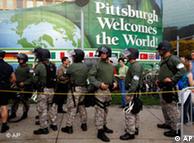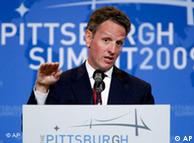ECONOMY | 25.09.2009
Financial regulation tops agenda at G-20 summit
Despite misgivings from German Chancellor Angela Merkel that talks at the Group of 20 economic summit in Pittsburgh would stray off of main topics, comments from US Treasury Secretary Timothy Geithner suggest the G-20 nations may be close to an agreement limiting bankers' compensation.
Before leaving Berlin for the summit, which brings together the twenty biggest developed and emerging economies, Merkel expressed concern that the United States would let its goal of rebalancing the global economy cloud the issue of market regulation.
Regulations and bonuses top the agenda
However, as the conference got underway with a 'working dinner’, Geithner said that market regulation was at the top of the United States' list of topics for the summit, adding that the G-20 nations were close to an agreement on a proposal to limit bankers' compensation.
"We are not going to walk away from the greatest economic crisis since the Great Depression and leave unchanged, and leave in place, the tragic vulnerabilities that caused this crisis," he said.
Many European leaders, including Angela Merkel and French President Nicolas Sarkozy, have called for increased accountability in the banking sector and caps to be placed on banking executive bonuses.
"Pittsburgh will be a decisive milestone in determining whether the issue of financial market regulation remains a central issue," Merkel said before departing from Berlin.
 Police and protesters clashed on sidelines of the summit
Police and protesters clashed on sidelines of the summit
The G-20 economic summit is the third of its kind in response to the global economic crisis. The first two meetings, in Washington D.C. and London, dealt with government stimulus spending and the causes of the crisis, while Pittsburgh focuses on the next steps and how to prevent another crisis on this level from happening again.
G-20 becomes main economic forum
World leaders have also announced that the Group of 20 would supplant the G-8 as the main economic governing council. The larger G-20 includes the biggest industrial countries, plus emerging economies such as China, Brazil and India.
"Today, leaders endorsed the G-20 as the premier forum for their international economic cooperation," the White House said in a statement after the summit dinner on Thursday. "This decision brings to the table the countries needed to build a stronger, more balanced global economy, reform the financial system, and lift the lives of the poorest."
Senior EU officials also revealed on Thursday that an agreement had been reached on shifting voting power in the International Monetary Fund to emerging economies, such as China, India, and Brazil.
"We've arrived at an agreement tonight on reform of the IMF to give underrepresented countries more of a say in its governance," European Commission President Jose Manuel Barroso told the Reuters newsagency.
Police use pepper spray against protesters
As the world leaders arrived in Pittsburgh ahead of the meeting, police and protesters clashed on the streets around the conference venue. Police blocked off some of the main streets leading downtown, forcing protesters onto side streets. Some small clashes ensued, and police used pepper spray canisters and non-lethal rounds to disperse the crowds.
Store windows were broken near the protests, and officials have confirmed that as many as 19 arrests have been made.
On Wednesday, 14 members of Greenpeace were arrested after hanging from a large banner they had suspended from a Pittsburgh bridge with a message against global warming for the world leaders attending the summit.
mz/AFP/AP/Reuters
Editor: Andreas Illmer /antigrafikon from DW.


No comments:
Post a Comment